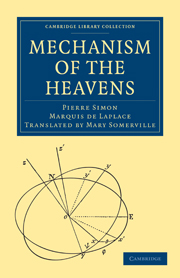Book contents
- Frontmatter
- PRELIMINARY DISSERTATION
- PHYSICAL ASTRONOMY
- BOOK I
- CHAPTER I DEFINITIONS, AXIOMS, &c
- CHAPTER II VARIABLE MOTION
- CHAPTER III ON THE EQUILIBRIUM OF A SYSTEM OF BODIES
- CHAPTER IV MOTION OF A SYSTEM OF BODIES
- CHAPTER V THE MOTION OF A SOLID BODY OF ANY FORM WHATEVER
- CHAPTER VI ON THE EQUILIBRIUM OF FLUIDS
- CHAPTER VII MOTION OF FLUIDS
- BOOK II
- BOOK III
- BOOK IV
- Index
- Errata
CHAPTER I - DEFINITIONS, AXIOMS, &c
Published online by Cambridge University Press: 29 August 2010
- Frontmatter
- PRELIMINARY DISSERTATION
- PHYSICAL ASTRONOMY
- BOOK I
- CHAPTER I DEFINITIONS, AXIOMS, &c
- CHAPTER II VARIABLE MOTION
- CHAPTER III ON THE EQUILIBRIUM OF A SYSTEM OF BODIES
- CHAPTER IV MOTION OF A SYSTEM OF BODIES
- CHAPTER V THE MOTION OF A SOLID BODY OF ANY FORM WHATEVER
- CHAPTER VI ON THE EQUILIBRIUM OF FLUIDS
- CHAPTER VII MOTION OF FLUIDS
- BOOK II
- BOOK III
- BOOK IV
- Index
- Errata
Summary
1. The activity of matter seems to be a law of the universe, as we know of no particle that is at rest. Were a body absolutely at rest, we could not prove it to be so, because there are no fixed points to which it could be referred; consequently, if only one particle of matter were in existence, it would be impossible to ascertain whether it were at rest or in motion. Thus, being totally ignorant of absolute motion, relative motion alone forms the subject of investigation: a body is, therefore, said to be in motion, when it changes its position with regard to other bodies which are assumed to be at rest.
2. The cause of motion is unknown, force being only a name given to a certain set of phenomena preceding the motion of a body, known by the experience of its effects alone. Even after experience, we cannot prove that the same consequents will invariably follow certain antecedents; we only believe that they will, and experience tends to confirm this belief.
3. No idea of force can be formed independent of matter; all the forces of which we have any experience are exerted by matter; as gravity, muscular force, electricity, chemical attractions and repulsions, &c. &c, in all which cases, one portion of matter acts upon another.
- Type
- Chapter
- Information
- Mechanism of the Heavens , pp. 4 - 18Publisher: Cambridge University PressPrint publication year: 2009First published in: 1831

